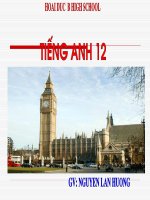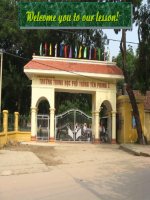Unit8-12Cb
Bạn đang xem bản rút gọn của tài liệu. Xem và tải ngay bản đầy đủ của tài liệu tại đây (138.53 KB, 11 trang )
Unit 8
Life in the future
---------------oOo-------------
Period N
o
42 - Lesson 1: Reading
Date of preparing: 28 /11/2008
I. Aims: By the end of the lesson. Ss will be able to:
- read for specific information about people and the Earth in the future.
- express their ideas about advantages and disadvantages of robots.
II. Teaching aids: textbook, pictures .…
III. Procedure:
Time
5
7
2
10
8
Teacher s Activities
- asks Ss to work in
pairs to ask and answer
the questions on page
84.
- goes around the class
to offer help if
necessary.
- calls on some Ss to
ask and answer in front
of the class.
- leads in the new
lesson.
- reads word by word.
- asks Ss to repeat in
chorus and individual
and writes them on the
blackboard.
- says some words in
English and asks Ss to
speak them out in
Vietnamese.
- asks Ss to read the
passage in silence and
do task 1.
- asks Ss to compare
the answer with a
partner.
- calls on some Ss to
answer in front of the
class.
- comments and gives
correct answer.
- asks Ss to work in
pairs to ask and answer
about the passage
- goes around the class
and offers help if
necessary.
- calls on some Ss to
answer in front of the
Content
A. Warm- up: Ask and answer the
questions
Lead- in: We dont know for sure what will
happen to our future life. Some people have
made optimistic predictions but the others
the pessimistic ones. And thats the focus of
our lesson today.
B. Pre- reading
I. Vocabulary:
- pessimistic (adj) [,pesi'mistik] : bi quan
- pessimist (n) ['pesimist] : ngời bi quan
- optimistic (adj) [,pti'mistik] : lạc quan
- optimist (n) ['ptimist] : ngời lạc quan
- terrorism (n) ['terrizm] : sự khủng bố
- terrorist (n) ['terrist] : kẻ khủng bố
- labor- saving (adj) ['leib,seivi] : tiết kiệm
sức lao động
- wipe smt out [waip]: xoá bỏ, phá huỷ
- space shuttle (n) ['speis'tl] : tàu con thoi
- depression (n) [di'pren] : tình trạng suy
thoái
II. Check vocabulary
C. While- reading
I. Task 1:
Answers:
1. pessimists
2. optimists
3. economic depression
4. terrorism
5. wiped out
6. space shuttle
II. Task 2: Answer the question.
Answers:
1. Many large corporations will be wiped
out and millions of jobs will be lost.
2. The security of the earth will be
threatened by terrorism as terrorist6 groups
will become more powerful and more
dangerous.
3. People will be living in much cleaner
Students Activities
- work in pairs to ask
and answer the
questions on page 84.
- some Ss ask and
answer in front of the
class.
- listen carefully
- repeat after the
teacher in chorus and
individual and write
down.
- do the task
individually.
- read the passage in
silence and do task 1.
- compare the answer
with a partner.
- some Ss answer in
front of the class.
- work in pairs to ask
and answer about the
passage
- some Ss answer in
front of the class.
Period N
o
43 - Lesson 2: Speaking
Date of preparing: 1 /12/2008
I. Aims: By the end of the lesson. Ss will be able to:
- talk about life in the future
- express their ideas and make predictions about life in the future.
II. Teaching aids: textbook, handouts.
III. Procedure:
Time Teacher s activities Content Students activities
4
7
10'
- asks Ss to work in groups
to make predictions about
life in the next 50 years.
- goes around the class and
offers help if necessary.
- calls on some Ss to give
their answers.
- gives feedback and
suggested answers.
- leads in the new lesson.
- reads word by word.
- asks Ss to repeat in
chorus and individual and
writes them on the
blackboard.
- rubs out some words and
asks Ss to remember.
- asks Ss to work in groups
to ask and answer about
what will have happened by
the 21
st
century.
- goes around the class and
helps if necessary.
- calls on some groups to
ask and answer in front of
the class.
- comments and gives
suggested answers.
A. Warm- up: Game: making predictions
Suggested answers:
1. All house work will be done by robots.
2. There will be a cure for most diseases.
3. Children wont go to school- they will
be able to study at home using a
computer.
4. People will live to at least 130.
...............
Lead- in: In todays speaking section, you
will practice talking about what will have
happened by the end of 21
st
century and
discuss predictions about life in the future.
B. Pre- speaking:
I. Vocabulary:
- holiday maker ['hldi,meik] : ngời đang
đi nghỉ
- resort (n) [ri:'z:t] : khu nghỉ mát
- Jupiter (n) ['du:pit] :Sao Mộc
- Mars (n) [ma:z] : Sao Hoả
- cure (n) [kju] : phơng thuốc
- declare (v) [di'kle] : chính thức thông
báo, tuyên bố rõ ràng, công khai
II. Check vocabulary: Rub out and
remember
C. While- speaking:
I. Task 1:
Useful expression:
S + will have + P
II
.
Model:
T - What will have happened by the end of
the 21
st
century?
A - Chinese astronauts will have landed on
Mars.
B - Chinese will have sent astronauts to
explore Mars.
C - Chinese astronauts will have set foot on
Mars.
D - Mars will have been discovered by
Chinese astronauts.
- work in groups to
make predictions
about life in the next
50 years.
- some Ss give their
answers.
- listen carefully
- repeat after the
teacher in chorus
and individual and
write down.
- do the task
individually.
- work in groups to
ask and answer about
what will have
happened by the 21
st
century.
- some groups ask
and answer in front of
the class.
12’
10’
2’
- asks Ss to work in pairs to
ask his/ her partner whether
the predictions Task 1 are
likely or unlikely to happen
and give reasons.
- works with a student to
model.
- goes around the class to
offer help if necessary.
- invites some pairs to act
out their dialogues to the
class.
- gives feedback and
correct answers.
-asks Ss to work in group to
discuss the question.
- invites some groups to
report their ideas.
- comments and gives feed
back.
- summarizes the main
points.
- assigns homework.
Suggested answers:
1. By the end of the 21
st
century:
+ the new moon city will have had a
population of over 200,000 people.
+ the third new moon city will have
opened.
+ there will have been three cities on the
moon.
2. By the end of the 21
st
century:
+ people will have live to be 150.
+ the 150
th
birthday party will have been
celebrated.
+ the oldest citizen will have been 150
years old.
…………….
II. Task 2: Giving opinion:
Useful expressions:
- It is said in the newspaper that……
- It says here that .……
- The newspaper says that .……
Model:
* A- It says here that by the end of the 21
st
century scientists will have found a cure for
the common cold.
B- I think it’s very likely to happen
because of the development of science and
technology. (science and technology will
have developed)
A- I quite agree with you.
* C- The newspaper says that Chinese
astronauts will have landed on Mars by the
end of the 21
st
century.
D- No kidding! Isn’t it too far from us?
I don’t think it is likely to happen.
C. You’re right. But I still think that
there will have been a solution to solve it
then.
D. Post-speaking: Task 3:
Suggested answer:
A hundred years from now on, maybe there
will have been no offices because people
will have worked at home on computers
linked to a head office. And I think it’s
likely that people will have driven their
cars around the world on a supper highway.
The supper highways will have connected
all the continents ..……
E. Wrapping:
- work in pairs to ask
his/ her partner
whether the
predictions Task 1
are likely or unlikely
to happen and give
reasons.
- some pairs act out
their dialogues.
- work in group to
discuss the question.
- some groups report
their ideas.
- imagine your life
in ten years. Say at
least five sentences
about yourself and
your family.
Period N
o
44 Lesson 3: Listening–
Date of preparing: 30/ 11/ 2008
I. Aim: By the end of the lesson, Students will be able to:
- listen for the understanding of the interview Dr David about people’s life expectancy in the
future
- listen for specific information
II. Teaching aids: Textbook, CD player ..……
III. Procedure:
Time Teacher s activities’ Content Students activities’
5’
5’
2’
15’
- asks Ss to work in pairs
to write down the factors
that help people have a
long and healthy life.
- goes around the class and
offers help if necessary.
- calls on some Ss to
answer in front of the class.
- gives feedback and
correct answers.
- reads words by word.
- asks Ss to repeat in chorus
and individually and write
them down.
- rubs out some words and
asks Ss to remember.
- lets Ss read the statements
for about 1 or 2 minutes.
- plays the CD player and
lets Ss listen to the passage.
- plays the CD player the
second time for Ss to catch
information they need.
- lets Ss listen to the tape
one more time if needed
A. Warm- up: Brainstorming
B. Pre- listening:
I. Vocabulary:
- incredible (adj) [in'kredəbl] : kh«ng thÓ
tin ®îc
- centenarian (n) [,senti'neəriən] : ngêi sèng
tíi 100 tuæi
- fatal (adj) ['feitl]: chÕt ngêi
- eradicate (v) [i'rædikeit] : tiÖt trõ, thñ tiªu
- life expectancy (np) ['laifiks'pektənsi]
: tuæi thä trung b×nh
- eternal (adj) [i:'tə:nl] : bÊt diÖt, vÜnh cöu
- mushroom (v) ['mʌ∫rum] : phat triÓn
nhanh
II. Check vocabulary:
C. While-listening:
I. Task 1: True or False
Answers:
1F (Many scientists predict )…
2F (eat more healthily, cut down
on things like butter, alcohol and cigarettes)
3F (80)
4T
5T
- work in pairs to write
down the factors that
help people have a
long and healthy life.
- some Ss answer in
front of the class.
- listen carefully.
- repeat in chorus and
individually and write
them down.
- do the task
individually
- read the statements for
about 1 or 2 minutes.
- listen carefully.









